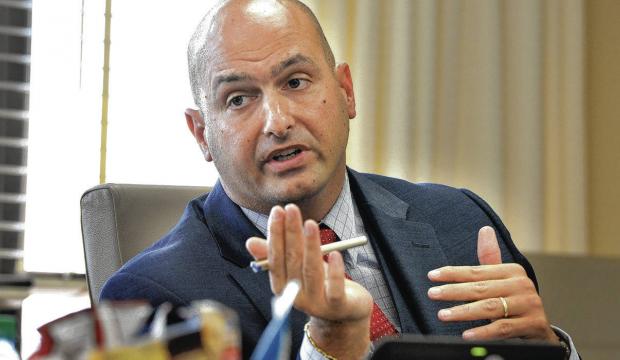
By Alisha Dixon
As thousands of Detroit parents prepare to send their children back to school in the next two weeks, many wonder if new Detroit Public School Community District superintendent Dr. Nikolai Vitti and the recently elected seven member school board are prepared and truly invested in the education and future of Detroit children. With just 90 days on the job, Vitti sat down with Detroit News Columnist Bankole Thompson on Tuesday to discuss the state of public education during a 90-minute forum as part of Wayne County Community College District’s Global Conversation Speaker Series.
Now responsible for more than 6,000 employees, 48,000 students and an annual fiscal budget of $660 million, Vitti said he remains optimistic about the future of the district and is confident that under his leadership, Detroit children will have the quality of education they deserve.
“I’m for K-12 traditional public education. If I want to create a narrative and a proof point that traditional public education is the best vehicle for social change and that traditional public education is the best vehicle to create change in the educational space, not charter, not private, not vouchers, then to prove that it has to happen here in Detroit,” the superintendent said.
“If it can happen here, then it can happen anywhere in the country.”
Recruiting and retaining teachers and leaders, being more efficient and transparent with resources, creating well rounded children and increased community and parental involvement through a parent academy, Vitti said are the key areas that he will focus on to turn DPSCD around.
“DPS at one point was considered one of the best public educational districts in the nation. There was a legacy and history and belief in public education.”
That legacy, he believes is directly tied to the districts’ teachers who have remained committed to the mission of educating the city’s children while working under less than desirable conditions and with even less resources than before.
“Our greatest challenge in this situation is special education. We need to build systems in recruitment to fill the void in special education.”
Vitti favors a return to residency programs and plans to increase the districts starting salary to $48,500, making working for DPSCD more appealing to qualified teachers as a way to fill the districts’ teacher shortage.
In addition to appealing to certified and highly qualified teachers, Vitto agreed that a culturally relevant curriculum is important for students and can expand and increase the quality of learning.
“When children see themselves in the curriculum, they are more confident and engaged. As an immigrant and father of four biracial children, I understand the power of seeing yourself reflected in the curriculum.”
During the forum, Thompson questioned Vitti if his appointment is yet another example of the seemingly constant revolving door of DPSCD leadership that has consistently failed Detroit children.
“What is different is an empowered elected board with authority at the local level and a leader that has actually done this and has scaled this work. That’s why there is reason for optimism, but there’s still space and rationale for skepticism. That will erode after every decision is made, when people are engaged, when people are heard and we slowly rebuild the district,” Vitti said.
Before leading DPSCD, for over four years Vitti served as superintendent of Duval County Public Schools in Duval County, Florida, the 20th largest school district in the United States. At DCPS, Vitti was responsible for over 130,000 students in 200 schools and a fiscal budget of $1.7 billion.
Under Vitti’s leadership, DCPS ranked among the first to fourth on the National Assessment for Education Progress’ highest performing inner city school districts in the country. DCPS also saw in increase in graduation rates from 67 percent in 2012 to almost 79 percent in 2016, the highest in African-American graduation rates in Florida.
“For the first time in over a decade, you have an empowered elected school board, seven individuals that are voted on by the people of Detroit. So, you’re seeing the power and influence in decision-making shift to Detroit locally.”
Vitti admitted that the power and influence in decision-making by previous leadership was flawed because they simply lacked the background suitable for the job.
“Emergency managers, and this is not about individual emergency managers, were political appointments who are not educators. You cannot change, rebuild or even lead and educational institution at its highest level in k-12 if you haven’t taught, if you haven’t been a principal, if you don’t understand that the unit of change happens in the classroom and that the greatest and most important relationship is between a teacher and a student. If you don’t understand that and how to build systems and processes to support and hold people accountable to that, then you can’t rebuild a school district.”